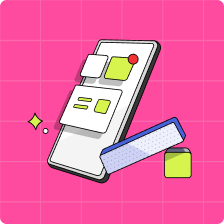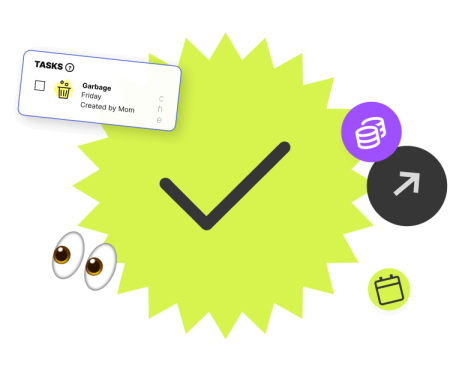Going from the relaxed summer vacation to setting an early morning alarm can be a real challenge! But establishing a daily routine for your kids helps take the stress out of back-to-school season. Here are some ways to create healthy routines and set your kids and teens up for success as they embark on the new school year.
Establish a daily routine with expectations defined
We spoke with Mardi Ennis-Gregory, a Family Service Coordinator, about how parents can help set their teens up for success. She has had over 20 years of experience working with adolescents and their families. She suggests that parents start with remembering what worked with their kids in the past. “When setting up rules and expectations, parents also need to be on the same page,” she says.
Questions parents should ask themselves to help build a daily routine for their kids:
- What time do your kids need to be out the door to get to school?
- What do teens need to do in the morning before anything else, like watching TV, can happen?
- Will your teen be responsible for making their lunches and/or breakfast?
- What time do they need to wake to get ready?
- Ask your kids: what do they like to eat? What are some healthy options they can have on hand? Then create a weekly snack and lunch list.
Once parents have brainstormed expectations about what needs to happen in the morning, they can also involve their kids in setting expectations around routines, sleep, downtime, and family chores.
“Come up with a plan before you talk to the kids. They’re already worried,” says Mardi. “They’re overwhelmed thinking about going back to school and a world they’ve been sheltered from for a long time.”
Bedtime routine for kids and teens
Sleep is so important, especially for tweens and teens. Teens’ bodies and minds are growing quickly, and sleep helps fuel that. While it’s important for teens to get enough sleep, one of the biggest disruptors to sleep is screens. Mardi suggests parents encourage kids to keep screens out of their bedrooms at night. “Kids gaming all night will have a hard time getting up for school the next day,” she says.
Of course, it’s not only gaming that’s keeping teens up at night. “There are group texts going on at one and two in the morning,” says Mardi. “And kids don’t want to feel left out.” In cases like this, she recommends parents have a conversation with their kids. It’s important for parents to set limits.
Finally, parents can also help their kids by modelling good behaviour. This means walking the walk and swapping scrolling through Instagram late for reading a book.
Tips for good sleep routines for kids:
- Set a consistent sleep schedule
- Switch off screens an hour before bedtime and charge phones outside the bedroom
- If your teen is unwilling to switch off from technology, look into tools that switch off the Wi-Fi or shut down iPhones and iPads
- Make sure their bedroom is cool and comfortable.
- Instead of setting the alarm on a smartphone, use a sunrise alarm clock
- Incorporate physical activity
- Pace homework, so kids aren’t up late cramming at the last minute

Morning routines for teens
If your kid is used to waking up, rolling out of bed and flipping open their Chromebook to start class, then getting ready in the morning and leaving the house for school might feel like a Herculean task.
“Part of setting up for success in the mornings begins the night before,” says Mardi. She suggests school bags are emptied the night before and put away in a dedicated spot, so teens aren’t scrambling to find things.
Tips for morning routine for kids:
- Although it’s so easy to press snooze, have your teen wake up when the alarm goes off
- Eat breakfast. Ideally, eat a meal that combines protein and complex carbs. Or mix up a smoothie with milk, fruit, and added protein and drink it on the go.
- If your teen doesn’t have time in the morning to make lunch, have them pack snacks and make lunch the night before
- Shower or bath the night before to save time in the morning
- Have them lay out the clothes they want to wear the night before
- For kids who struggle with executive function, parents may want to create a list for them to check off (e.g. pack lunch, homework, water bottle, and a clean mask).

After school routines for teens
When it comes to an after-school routine, Mardi says it’s not a case of one size fits all. “We know our children, so reading their cues and understanding their needs is important,” she adds. Mardi also suggests there is a clear transition between school and home. “If your child has held it together all day, they probably need some downtime first.”
Tips for after school routine for kids:
- Empty school bag, including lunch box and homework, and put school bag away
- Grab a snack before moving on to a new activity
- Build in some downtime before moving onto homework or daily chores
- Have a quiet, distraction-free space for kids to do their homework
- Include physical activity. It can be as simple as adding more steps to their day by walking to/from school (or part of the way) and tracking their steps.
Keep children physically active
For some kids, downtime means watching Netflix, while for others, it’s letting off steam by running around outside if that’s your child—great!
“Encourage outdoor time with friends,” says Mardi. “Make it part of a structured routine.” If your teen isn’t the type to shoot a few hoops or go for a bike ride, there are still other ways they can add physical activity into their day. “Have conversations with your teens about keeping your body moving,” says Mardi. “And create a plan together.”
Assign weekly and daily household chores
Why are chores important for kids?
“We all have a responsibility in our house,” explains Mardi. “It’s a collective unit. Chores are just a natural extension of that.” It’s important our kids learn responsibility. And chores are a way for teens to do just that. There’s also plenty of research about chores and children to explain that chores can lead to greater success in school, work, and relationships. Chores for teenagers can also be a good way for them to learn about the value of money and earn a bit of extra cash for spending.
Common household chores for kids
OK, so you’re ready for your teen to contribute to the household, but what are some age-appropriate chores for tweens and teens to do?
- Collecting and taking out garbage
- Making dinner one night a week
- Helping with food prep
- Clearing up the kitchen after dinner
- Babysitting
- Doing laundry, from start to finish
- Cleaning the dishes (whether that’s by hand or stacking, unstacking a dishwasher)
- Cleaning the bathroom
- Cleaning the kitchen
- Mowing the lawn
- Yard work
- Walking the dog
- Vacuuming
- Washing the floors
- Cleaning their bedroom
- Helping with food shopping
To help manage household chores, our free printable chore charts let you assign and keep track of tasks for everyone in the family.
Looking for more chore ideas for your teenagers? Read our articles on winter jobs for kids and spring chore ideas for kids.

How to set realistic expectations around household chores
Weekdays can be hectic for families, so scheduling more labour-intensive household chores on the weekend means your teens are more likely to be successful. “Every Saturday morning, my kids clean their room,” explains Mardi. “It’s part of their routine. It doesn’t matter what time, but the expectation is that it’s done before they do something else.”
When it comes to giving teens chores, it’s also important to involve them in the process. Mardi suggests parents ask their kids:
- What chores do you want to do?
- What chores would you rather not do?
- What can you manage to do during the week?
- Which chores do you want to save for the weekend?
- For chores like making dinner once a week, which night do they plan to cook?
Build daily routines slowly
Remember, for many kids, fall isn’t just about transitioning back into a routine, it’s also transitioning back to the classroom. If your kids weren’t doing chores in the summer, Mardi suggests parents wait a couple of weeks for them to settle back into school, then add in chores. It’s likely your kids are going to be cranky and tired at the beginning of the school year. As parents, understanding this makes it easier to walk away and not engage. Kids and teens need time to transition. That’s why it’s important to start slowly, so you can set your kids up for success.
Track chores and help teens learn the value of a dollar
Using an app to track chores is convenient for managing tasks, especially if your family spends lots of time on their phones and devices. Mydoh helps kids and teenagers develop real-life money skills early while giving parents transparency and peace of mind. Parents can assign chores that allow kids and teenagers to earn money through allowance, which can be accessed using their Smart Card for desired purchases. Parents stay involved by tracking their spending and checking their balances, all in real-time.
Get the Mydoh app and start assigning chores to your kids! It helps them earn money and teaches them responsibility by doing household tasks. Plus, you can track their progress easily.
This article offers general information only and is not intended as legal, financial or other professional advice. A professional advisor should be consulted regarding your specific situation. While the information presented is believed to be factual and current, its accuracy is not guaranteed and it should not be regarded as a complete analysis of the subjects discussed. All expressions of opinion reflect the judgment of the author(s) as of the date of publication and are subject to change. No endorsement of any third parties or their advice, opinions, information, products or services is expressly given or implied by Royal Bank of Canada or its affiliates.








